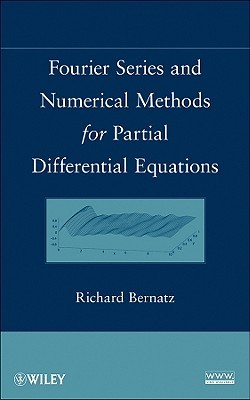
- We will send in 10–14 business days.
- Author: Richard Bernatz
- Publisher: Wiley
- ISBN-10: 0470617969
- ISBN-13: 9780470617960
- Format: 16.3 x 23.6 x 2.3 cm, kieti viršeliai
- Language: English
- SAVE -10% with code: EXTRA
Reviews
Description
The importance of partial differential equations (PDEs) in modeling phenomena in engineering as well as in the physical, natural, and social sciences is well known by students and practitioners in these fields. Striking a balance between theory and applications, Fourier Series and Numerical Methods for Partial Differential Equations presents an introduction to the analytical and numerical methods that are essential for working with partial differential equations. Combining methodologies from calculus, introductory linear algebra, and ordinary differential equations (ODEs), the book strengthens and extends readers' knowledge of the power of linear spaces and linear transformations for purposes of understanding and solving a wide range of PDEs.
The book begins with an introduction to the general terminology and topics related to PDEs, including the notion of initial and boundary value problems and also various solution techniques. Subsequent chapters explore:
- The solution process for Sturm-Liouville boundary value ODE problems and a Fourier series representation of the solution of initial boundary value problems in PDEs
- The concept of completeness, which introduces readers to Hilbert spaces
- The application of Laplace transforms and Duhamel's theorem to solve time-dependent boundary conditions
- The finite element method, using finite dimensional subspaces
- The finite analytic method with applications of the Fourier series methodology to linear version of non-linear PDEs
Throughout the book, the author incorporates his own class-tested material, ensuring an accessible and easy-to-follow presentation that helps readers connect presented objectives with relevant applications to their own work. Maple is used throughout to solve many exercises, and a related Web site features Maple worksheets for readers to use when working with the book's one- and multi-dimensional problems.
Fourier Series and Numerical Methods for Partial Differential Equations is an ideal book for courses on applied mathematics and partial differential equations at the upper-undergraduate and graduate levels. It is also a reliable resource for researchers and practitioners in the fields of mathematics, science, and engineering who work with mathematical modeling of physical phenomena, including diffusion and wave aspects.
EXTRA 10 % discount with code: EXTRA
The promotion ends in 23d.19:13:07
The discount code is valid when purchasing from 10 €. Discounts do not stack.
- Author: Richard Bernatz
- Publisher: Wiley
- ISBN-10: 0470617969
- ISBN-13: 9780470617960
- Format: 16.3 x 23.6 x 2.3 cm, kieti viršeliai
- Language: English English
The importance of partial differential equations (PDEs) in modeling phenomena in engineering as well as in the physical, natural, and social sciences is well known by students and practitioners in these fields. Striking a balance between theory and applications, Fourier Series and Numerical Methods for Partial Differential Equations presents an introduction to the analytical and numerical methods that are essential for working with partial differential equations. Combining methodologies from calculus, introductory linear algebra, and ordinary differential equations (ODEs), the book strengthens and extends readers' knowledge of the power of linear spaces and linear transformations for purposes of understanding and solving a wide range of PDEs.
The book begins with an introduction to the general terminology and topics related to PDEs, including the notion of initial and boundary value problems and also various solution techniques. Subsequent chapters explore:
- The solution process for Sturm-Liouville boundary value ODE problems and a Fourier series representation of the solution of initial boundary value problems in PDEs
- The concept of completeness, which introduces readers to Hilbert spaces
- The application of Laplace transforms and Duhamel's theorem to solve time-dependent boundary conditions
- The finite element method, using finite dimensional subspaces
- The finite analytic method with applications of the Fourier series methodology to linear version of non-linear PDEs
Throughout the book, the author incorporates his own class-tested material, ensuring an accessible and easy-to-follow presentation that helps readers connect presented objectives with relevant applications to their own work. Maple is used throughout to solve many exercises, and a related Web site features Maple worksheets for readers to use when working with the book's one- and multi-dimensional problems.
Fourier Series and Numerical Methods for Partial Differential Equations is an ideal book for courses on applied mathematics and partial differential equations at the upper-undergraduate and graduate levels. It is also a reliable resource for researchers and practitioners in the fields of mathematics, science, and engineering who work with mathematical modeling of physical phenomena, including diffusion and wave aspects.


Reviews